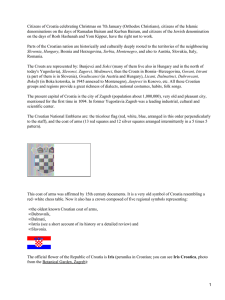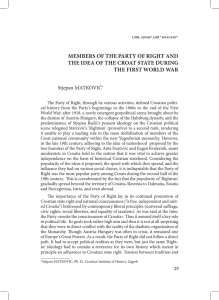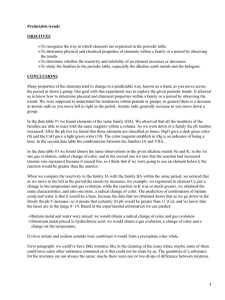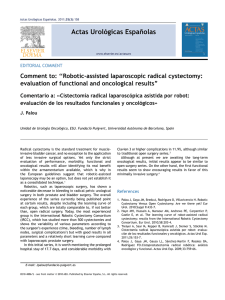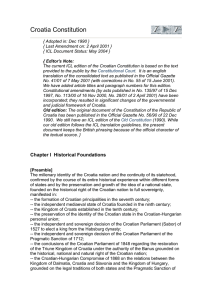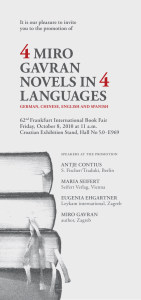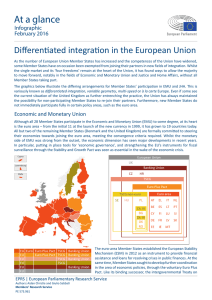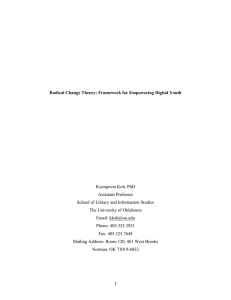Right-wing extremism in Croatia - Bibliothek der Friedrich
Anuncio
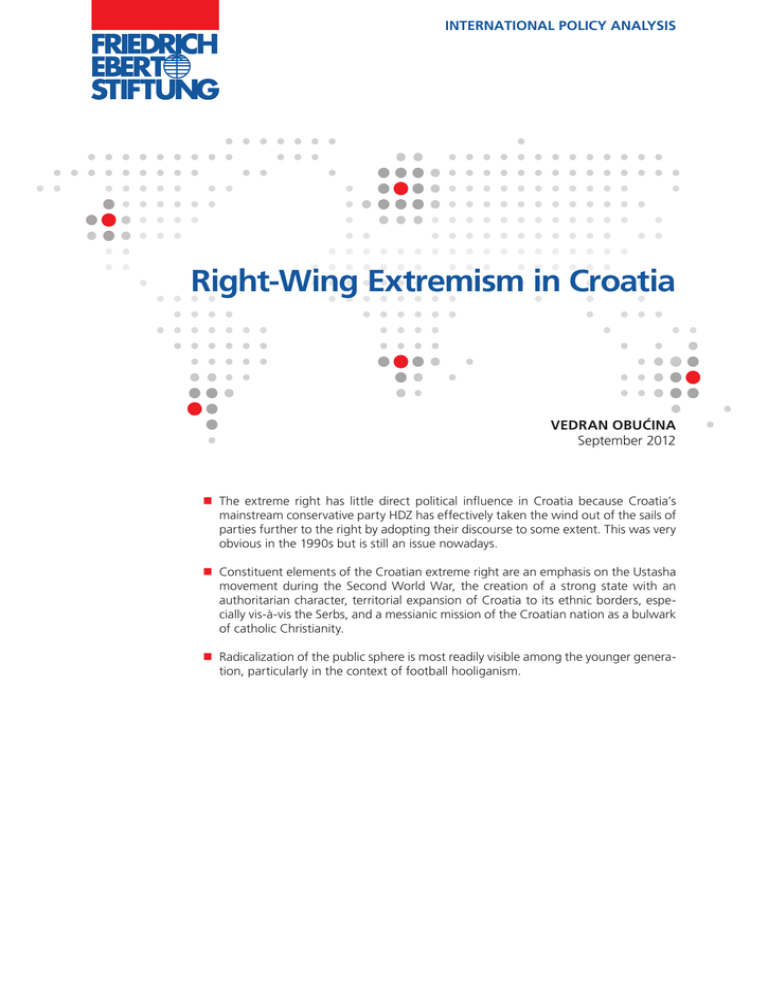
INTERNATIONAL POLICY ANALYSIS Right-Wing Extremism in Croatia VEDRAN OBUÆINA September 2012 n The extreme right has little direct political influence in Croatia because Croatia’s mainstream conservative party HDZ has effectively taken the wind out of the sails of parties further to the right by adopting their discourse to some extent. This was very obvious in the 1990s but is still an issue nowadays. n Constituent elements of the Croatian extreme right are an emphasis on the Ustasha movement during the Second World War, the creation of a strong state with an authoritarian character, territorial expansion of Croatia to its ethnic borders, especially vis-à-vis the Serbs, and a messianic mission of the Croatian nation as a bulwark of catholic Christianity. n Radicalization of the public sphere is most readily visible among the younger generation, particularly in the context of football hooliganism. VEDRAN OBUÆINA | RIGHT-WING EXTREMISM IN CROATIA Contents 1. 2. 3. 4. Introduction���������������������������������������������������������������������������������������������������������������������2 The Idea of a Croatian Radical Right�����������������������������������������������������������������������������2 Radical Right Participants in Croatia’s Public Sphere���������������������������������������������������4 Social Support for the Radical Right . . . . . . . . . . . . . . . . . . . . . . . . . . . . . . . . . . . . . . . 7 5. Consequences and Counter-Strategies�������������������������������������������������������������������������9 References ���������������������������������������������������������������������������������������������������������������������10 1 VEDRAN OBUÆINA | RIGHT-WING EXTREMISM IN CROATIA 1. Introduction 72,778 votes; the coalition Croatian Party of Rights Ante Starčević and the Croatian Pure Party of Rights, 66,150 votes; Croatian Growth, 29,797; the coalition Action for a Better Croatia, the Croatian Demo-Christian Party and Only Croatia – Movement for Croatia, 13,258; the Autochthonous Croatian Party of Rights, 5,768; the National Democrats, 2,046; and the Family Party, 1,566). These results clearly show that the right, both radical and non-radical, is fragmented. Nevertheless, 9 percent of Croatia’s parliament would be made up of far-right MPs if the will of Croatian voters had been taken into account. This article will not discuss all of these participants in detail, but only those with a larger public presence whose short-term role suggests what potential power the radical right might have in Croatia. Since the onset of the twenty-first-century, no radical right party has won seats in any of Croatia’s parliamentary elections,1 a feature that distinguishes the country positively from its neighbours (particularly Hungary and Serbia). Throughout this article, the general term radical right is used for simplicity’s sake, but it is important to note that such heterogeneous parties should not (and cannot) be easily classified as a single entity, i. e., they should at least be divided into sub-entities (e. g., anti-immigrant, neo-fascist, or populist etc.) that share a basic common denominator. In this respect, there have been several positive breakthroughs. Sabrina Ramet has identified various types of right-wing parties, using such categories as ultranationalistic, fascist and crypto-fascist, clerical, ultraconservative, and radical populist, all of which may be found in Europe’s post-communist states (Ramet, 1999, 24). These terms can be used to describe almost any party considered to belong to the radical right. As such, Pippa Norris is right to claim that radical right is the most appropriate term (Norris, 2005, 46). She notes that it has been widely used in the American social sciences since 1963 and is also employed by the German Office for the Protection of the Constitution. At the same time, this allows us to avoid the danger of prematurely (and without factual or scientific verification) attaching a label to a party that has a more complex and specific categorisation (e. g. anti-immigrant or neo-fascist parties). 2. The Idea of a Croatian Radical Right Of all the radical right parties officially standing for parliament in 2011 only the Croatian Pure Party of Rights can said to have any power or to function institutionally. The radicalisation of all right-wing party activities became paralysed during the HDZ’s two terms in office, a fact which applies especially to the Croatian Pure Party of Rights as well as the newly established Croatian Party of Rights Ante Starčević, both now profiled as conservative right parties. Other radical right parties that stood for election are either too small or lack significant resources (financial, human and organisational) and are therefore not worth including in this article. However, there are two other parties that received considerable media coverage: the Autochthonous Croatian Party of Rights and the Croatian Liberation Party. The profile of other right-wing parties tends more towards conservative populism and euro-scepticism, alongside those which advocate an enhanced role for Christianity in the state; but these parties in many cases lack the anti-democratic, anti-system, and extremist attitudes that would make them truly radical right-wing. In their current makeup they constitute part of the classic right but have not adopted radical positions in Croatian politics. After all, their electoral performance proved to be too weak; they in most cases have small memberships and weak organisational structures; and they do not hold regular party congresses or have access to sufficient material and personal resources. The role of the radical right, not only in the form of political parties but also as a non-party / sub-cultural social stratum, has perhaps been exaggerated by the Croatian public, especially when we consider how disorganised its operations in Croatia are. One has only to look at the lack of votes for a single radical right party in Croatia’s parliamentary elections to realise how obvious this conclusion is. However, if the absolute number of votes and the percentage of the vote are counted for all parties right of the Croatian Democratic Union (HDZ), Croatia’s mainstream conservative party, we find that parties of this type won 191,363 votes (or 7.97 percent of the vote) in the parliamentary elections in autumn 2011. The Croatian Party of Rights, for example, won 1. Since 2003 the Croatian Party of Rights (HSP), in our opinion, cannot be categorised as a radical right party; rather it belongs within the conservative right. 2 VEDRAN OBUÆINA | RIGHT-WING EXTREMISM IN CROATIA There are, however, other, more radical right-wing political organisations which tend not to be represented in parliament, including the association of Croatian Nationalists (which operates as an extended arm of the Croatian Pure Party of Rights). Although officially abolished as a political party, the New Croatian Right still operates via its most well-known representative, Mladen Schwartz, and his close aids. In this category, other groups worth noting include the Croatian National Front, the Croatian Ritual Association of Fighters of the Second World War and the National Resistance. two significant versions of this belief are the territory of Croatian Banate (1939) and the more extreme demands that seek to renew the entire Independent State of Croatia, encompassing Srijem, Bačka, Sandžak, Boka Kotorska and all of Bosnia and Herzegovina; (5) the idea of the »other« as a natural enemy, a designation applied most ubiquitously to the Serbs. The consequence of this is that the radical right strongly opposed any negotiations with the Serbs, particularly those aimed at granting Serbs cultural or political autonomy in Croatia in the early 1990s; (6) conservative domestic and isolationist foreign policies based on classic anti-liberal and antiwestern philosophies; today this can be seen in their resistance to Croatia’s EU accession; (7) the messianic mission of the Croatian nation as a member of Western Europe’s Catholic civilisation and a bulwark of Christianity, which considers the nation’s purity and genuine traditional society to derive from its contact with the Central European lowlands, the Dinaric highlands and the Adriatic depths. This cultivated a belief in a specific feature of ethnic origin and incoherence with any other group (Slavic, Germanic, Gothic, etc.). Ultimately, violence stemming from Croatia’s radical right nominally lacks clearly defined political goals. Such violence is usually spearheaded by football fan-clubs and neo-Nazi groups, such as skinheads, who operate via media channels like Ultimatum, Open Forum and Stormfront. An analysis of the state-building ideas of the radical right in the early 1990s reveals several patterns which remain evident today among followers of extremist groups. These patterns include: (1) an emphasis on the historical continuum of the Croatian state and the success of the Ustasha movement and the Independent State of Croatia (NDH, 1941–1945), whose symbols and platform continue to exist in the public addresses of modern members of the radical right; (2) gaining Croatian independence by military means – military conflict heightens the importance of authoritarian power and the Croatian armed forces as well as paramilitary organisations. The most important of these, the Croatian Defence Forces (HOS) – a voluntary military force of the Croatian Party of Rights (HSP)2 – was the outgrowth of this ideology; (3) the creation of a strong state with an authoritarian character; this is evidenced by the radical right’s hailing of the original semi-presidential system and of former Croatian President FranjoTuđman’s attitude to political and media opposition. For some, however Tuđman was too lenient; Mladen Schwartz criticised him as a poltroon of liberal democracy in his book Croatia after Tuđman; (4) the territorial expansion of Croatia to its historical, natural and ethnic borders, an especially important sentiment during the Homeland War; the Most of these beliefs originate directly from the ideology of the Ustasha movement. The Ustasha, namely, wanted for the first time in modern history to establish a Croatian national state and in this way achieve the national integration of all Croats while simultaneously removing all ethnic, racial and religious minorities considered to be foreign that might jeopardise the interests of the Croatian nation (Bartulin, 2007, 209). In addition, opposition to Yugoslavism gave rise to the idea that Croats were different to other south Slavs,3 especially Serbs. With regard to Serbs, ethnic and racial differences were stressed, while Jews and Roma were identified as a second foreign body within the Croatian national community (Volksgemeinschaft). By distorting and misinterpreting the founder of the Croatian Party of Rights Ante Starčević, the Ustasha covertly equated the commitment of Starčević, often referred to as the Father of the Fatherland, with the ideals of the French Revolution and with contempt for German culture, which is still true today for many members of the Party of Rights and other radical right movements. Moreover, the ideas of the Ustasha are still espoused by expatriate Ustasha apologists and other like-minded persons. 2. Some units of HOS were named after some Ustasha officers, such as the IX battalion »Rafael vitez Boban« from Split or the 13th battalion »Jure vitez Francetić« from Tomislavgrad in Bosnia and Herzegovina. President Tuđman compared them to Nazi SS troops (http://www. hsp1861.hr/vijesti/200804demg.htm). 3. Ustasha, as well as some other former members of the radical right, considered Croats to be Goths and not Slavs. Pavelić also talked about Croats as Goths at Hitler's reception (Cipek, 2008). 3 VEDRAN OBUÆINA | RIGHT-WING EXTREMISM IN CROATIA 3. Radical Right Participants in Croatia’s Public Sphere more easily. Simultaneously, they believe the traditional family has been decimated and that same-sex marriages have been imposed upon the state, while ideas of patriotism, the status of the Catholic Church (which they concede should be separate from the state), ethics, work and diligence have been subdued. The HČSP presents itself as the party most capable of preserving public ethics as an article of the constitution. Their programme stresses the protection of life from conception to death, the prohibition of abortion and euthanasia, aid to mothers with four or more children, free education and social justice reforms. In addition, policies to encourage the birthrate are extremely important because they consider the family the basic cell of society and the only way to guarantee an individual’s sound and harmonious upbringing. The HČSP believes that the duty of the »Croatian state« is to support the activities of all religious communities, because belief in God is the strongest means to achieve a noble and ethical life, without which both individuals and nations will degenerate. In an ethnopolitical sense, the party sees the Croatian people as religiously unique and encourages religious tolerance and love for other denominations. The Croatian Pure Party of Rights (HČSP) The Croatian Pure Party of Rights (HČSP) is considered a pivotal party among Croatia’s radical right. It is deemed orderly on account of its peaceful acceptance of parliamentarianism and the rules of party competition in the political arena. It respects legal provisions and supports the republican system with the prime minister as the head of government, etc. However, in its essence the party is traditional, ultra-conservative, populist, nationalistic, homophobic, and anti-elitist. It calls for a strong state and tends towards xenophobia. It has a freedomoriented approach to the Croatian nation based on ethnic-national ideals. The founders of the party’s platform are Ante Starčević and Eugen Kvaternik, but it also derives some of its ideas from Antun and Stjepan Radić, thus connecting conservative, freedom-loving ideals with peasant populism and the radicalism of nineteenthcentury lawyer and politician Josip Frank. The party does not have direct links with either historical fascist or Nazi regimes, but the iconography of the Ustasha movement is a party mainstay. Along with some statements to this effect, its offices feature pictures of Ante Pavelić, the historical leader of the Ustasha movement, and of party leaders either together with Pavelić, or raising their right hands in commemoration of the Ustasha salute. The party uses the slogan »God and Croats« as a kind of link to the Ustasha regime; however, it should be noted that this slogan is much older than the Ustasha regime despite being clearly recognised in public discourse as an Ustasha salute. In addition, the official party slogan is »Ready for Home«, which was also the official slogan of the Independent State of Croatia. Yet in its Basic Principles, the party states explicitly that enemies of Croatia have tried for centuries to wipe out Croatian culture – in other words, it presents a distorted version of the creation, operation and fulfilment of the Independent State of Croatia and views the fight for Croatian independence as being the most important period in Croatian history. Additionally, the HČSP vehemently criticises the ethical relativism of Croatian society under the influence of the west and globalists (»philanthropists«) by means of »local sycophants, traitors, and poltroons«. As such, their goal is to earmark individuals with more traditional roots in order to manipulate them With respect to social and economic policy, the HČSP follows the predominant trends of the radical right and opposes neo-liberal capitalism and globalisation; instead, it supports in equal measure a strong national economy and social justice. The party is expressly antielitist and calls for a state based on small and mediumsized business, the ecological production of food, the cultivation of untended soil, and tourism. This, it argues, would boost industry and the manufacture of Croatian products. The party also espouses populist tendencies supporting small businesses, fishermen, cattle breeders, farmers and craftsmen. It encourages links between the so-called home and exiled Croats, seeks to recover Croatia’s historic fishing zone and has called for the creation of a strong national bank, which would restore Croatia’s financial sovereignty. The elite are seen as a criminal organisation mired in corruption as a result of financial transformation. In particular, the governments of the Social Democrat Ivica Račan and center-rightist Ivo Sanader are held to blame in this respect. The HČSP further calls for a law on high treason to be passed that would allow the elite to be sentenced to imprisonment or ordered to pay fines. They believe the most prudent way to reduce corruption is to minimise the state administration, which they regard as the fulcrum of corrupt operations. 4 VEDRAN OBUÆINA | RIGHT-WING EXTREMISM IN CROATIA The fate of expatriates has a key role to play in Croatian politics. Thus, the HČSP believes Croatians in Bosnia and Herzegovina should have a constitutional, Godgiven and natural right to support from the homeland. The party calls for the revision and annulment of the Dayton Peace Accords, in particular the abolition of the entities in Bosnia and Herzegovina and the creation of cantonal divisions there. In the hope that they will return home, the party calls on Croatians abroad to help purge the state of bad government and invest in Croatian resources. In the meantime, it advocates giving them a stronger parliamentary presence and additional votes. On the other hand, it also advocates supporting the »emigration« of autochthonous Croatian minorities living in other countries; as such the party supports solutions that would contribute to the survival of Croats in Boka Kotorska, Banat, Bačka, Srijem and other areas. highlight the Croatian left’s positive heritage. In sum, Yugoslavism is an unacceptable category for the HČSP because any attempt to intermingle or identify Croats with others is in discordance with nature and with the right of the Croatian people to exist. The HČSP’s unwavering opposition to globalisation makes it a highly euro-sceptical party. In line with this it advocates breaking off EU accession negotiations, particularly because it sees Croatia as being at a disadvantage. It also believes that it was wrong not to hold a national referendum on Croatia’s accession to NATO. Finally, the HČSP opposes cooperation of any kind with the Hague Tribunal, which it considers to be nothing more than a political tribunal punishing Croatian war heroes. The HČSP accepts that minorities (by which it means exclusively national minorities) should be granted all national, religious and cultural rights but it opposes their parliamentary participation. The HČSP programme calls for the abolition of eight fixed seats for minorities, and in particular considers the allocation of three seats to the Serbian national minority to be absolutely unfounded. It also calls for the abolition of double voting rights and of the right to local minority representation in municipal, town and county assemblies, and, with the exception of culture, rejects the complete equality of minorities within Croatian society. Conspicuously, the HČSP voices no opinion on other discriminated minority groups, including women and LGBT (lesbian, gay, bisexual and transgender) persons. Yet the party’s public activities reveal its strong opposition to LGBT rights, with its wholehearted participation in anti-LGBT protests taking the right of free speech to its limits. This is especially problematic since the HČSP appears side-by-side with a much less significant association, the Croatian Nationalists, at anti-gay pride parades. The association is notorious in Croatia for its protests against Zagreb Pride and calls on »all nationalists, patriots, Ustasha, fascists, national-socialists, skinheads and others who have the courage to rid Croatia of the scourge and join the movement«. By most indications, only the Croatian Nationalists were responsible for the beatings at the pride festival. Yet at joint meetings between the HČSP and the Croatian Nationalists, it became evident that the former condones hate speeches, fascist insignia and calls for violence. The party regularly participates in the commemoration at Bleiburg, one of several sites where The party’s perspective on the Homeland War follows the classic ideas of the Croatian right. However, the HČSP believes that the war should go under the official name of Croatian Defensive-Liberation War on the grounds that it was a state-building war rather than a civil conflict. The party also believes that the Homeland War has been relativised, its heroes sentenced and criminals exonerated. More specifically, it sees the deTuđmanisation of Croatia by the HDZ as akin to »deCroatianisation« and believes that it has deprived heroes of their status. It is worth noting that their program explicitly mentions Ante Gotovina, Mladen Markač, Mirko Norac and Dario Kordić and calls for a general amnesty for Croatian »warriors« because they consider that the crimes committed have already been dealt with. The HČSP regards the remnants of the Yugoslavian communist system as a constant threat and calls for a final settling of scores with the communists via lustration. Believing that successive Croatian governments have remained in the hands of communists and their followers, the HČSP calls for the demolition of all Josip Broz Tito statues, particularly in his hometown of Kumrovec, as well as an amendment to the preamble of the Constitution of the Republic of Croatia, which states that the National Anti-Fascist Council of the People’s Liberation of Croatia (ZAVNOH), which preceded the Croatian Parliament (Sabor) in the 1940s, is one of the foundations of the Croatian state. It is interesting to note that the HČSP never mentions the heritage of Franjo Tuđman, who was a Yugoslav general and who demanded that ZAVNOH be mentioned in the Constitution in order to 5 VEDRAN OBUÆINA | RIGHT-WING EXTREMISM IN CROATIA collaborators were executed without trial at the end of the Second World War, and openly praises Ustasha criminals, especially the leader of the Black Legion, Jure Francetić, who is commemorated in Slunj. Slunj, it must be noted, was once home to a Francetić monument; however, it was removed in the middle of the night during the HDZ’s term in office. before fleeing to Germany. Both were caught and killed by the Yugoslavian State Security Administration (UDBA) when they attempted to enter the country a second time in 1974. At this point, the original HNF ceased operations. The modern version of the HNF was founded in 2010, and Stjepan Penc, a volunteer during the Homeland War, became its president. The organisation’s charter suggests that it is active among youth and indeed it has two youth organisations: the Youth of HNF (for those between 15 and 24), with Denis Bašnec as its president; and Hope (for those younger than 15), over which Luka Labrović presides. The HNF cooperates closely (via joint protests and shared meetings) with the more marginalised Autochthonous Croatian Party of Rights. In 2010 the two organised a protest against an anti-fascist monument located in the village of Srb, calling it a Chetnik monument, and set the Yugoslav flag on fire in retaliation for what it perceived as Serbian arrogance in the newspaper Novosti. In 2011 the HNF organised two antigovernment protests in Karlovac: one independent and one in cooperation with the Veterans’Action association. The HČSP operates through branch offices, Zagreb’s city council and other county executives and clubs. The party’s central bodies include the General Executive, its main political body; the Main Headquarters, which acts as the supreme political body between meetings of the General Executive; the president of the party; vice presidents; a line officer; a political secretary, the Supervisory Board; and the Court of Honour. The party’s current president is Josip Miljak, Luka Podrug is the political secretary and Goran Rohaček and Dalibor Durdov are the two vice presidents. The party has branch offices in every Croatian county. One of the most active clubs is the HČSP Youth whose president, Frano Čirko, is very active in the public realm. Within the party, the Milan Šufflay Academy is responsible for political education. Today the HNF is an ultraconservative, nationalistic organisation that voices positive views about the legacy of the Ustasha movement. Its members highlight three core values: belief in God; the traditional Croatian family; and the Croatian nation. The goal of the HNF is to establish a »truly Independent State of Croatia« based on these three values. HNF uses the Ustasha insignia and its slogans »Ready for Home« and »God and Croats« and believes that the idea of an independent state (NDH) has been needlessly abandoned (claiming that every war always has a dark side). In the spring of 2012 the party organised an International Nationalist Conference. Amidst major public scandals, which included the prohibition of a nationalist march through the centre of Zagreb and the group’s inability to rent a venue to host its conference, the HČSP for the first time entered into cooperation with likeminded parties abroad. The HČSP hence now identifies itself at the international level with movements and parties such as the Hungarian Jobbik, the Hungarian Youth Movement of 64 Counties, the Bulgarian VMRO, the Bulgarian National Alliance, the French Renouveau Français, and the Flemish patriotic movement Voorpost. It regards Croatian ethnicity as exclusive, stating that the Croatian people »do not belong to any ethnic group, including the Slavic group with which it is identified due to linguistic similarities, for everyone knows that the Croatian people are a separate group«. Further, a number of territories outside the present borders of Croatia, including Boka Kotorska, eastern Srijem, Bačka, Banat, and Bosnia and Herzegovina, are claimed as part of the Croatian state,. They claim that each of these units, known simply as the Croatian Homeland by HNF members, has been part of Croatia both geographically and in terms of culture and history since the seventh century, and as such no one has the right to divide it. On the contrary, Bosnia and Herzegovina is referred to as »the The Croatian National Front The Croatian National Front (HNF) operates as a nationalist and radical right organisation in Croatia, and as the successor to the former émigré organisation of the same name. It was founded abroad in 1967 by emigrants Mile Prpić and Ivan Matičević, both of whom were members of the Croatian Liberation Movement led by Mile Rukavina Backo. According to official data, both managed to enter Yugoslavia in the summer of 1972, spread propaganda material and kill a policeman in Karlobag 6 VEDRAN OBUÆINA | RIGHT-WING EXTREMISM IN CROATIA Holy Croatian Homeland« and is considered an inseparable part of the »Croatian State«. The HNF programmes include admiration for statism, the cultivation of a strong state and the espousal of duties, responsibilities and authoritarianism. Its views on justice and punishment are also very clear: those who have publically offended the »Croatian State« must suffer sanctions ranging from life imprisonment to forced labour. demonstrations, graffiti and conducting electronic warfare with its opponents. At public demonstrations, activists cover their faces to prevent identification by the police or their opponents, which limits the scope of actions that may be taken against them at marches. Like other leftist organizations, the HNO opposes globalisation and capitalism, but for different motives than the parties described above. Their cause is National Socialism, although the HNO claims that it does not have any connections to neo-Nazi movements or skinheads. While the organisation claims to be open to everyone, drug addicts/drug dealers, homosexuals, bisexuals, alcohol abusers, and bullies, etc. are clearly not welcome. They characterise themselves neither as leftist nor rightist, but simply as in opposition to the system and as a group that encapsulates the good ideas of both the radical left and the radical right. In short, they view their position as a radical alternative to traditional politics. It should be noted that it is the only radical organisation that rejects parliamentarianism. The HNF considers any formal ties to transnational organisations (e. g., Yugoslavia, the European Union, NATO, etc.) to be unacceptable. Members of the HNF believe that such connections will lead to a loss of independence, to the Americanisation and Europeanisation of Croatian society, to the eradication of Croatian traditions (customs and the cultural and linguistic variety of Croats), and the squandering of natural resources, which it regards as national assets. The Croatian National Resistance – Alliance of Autonomous Socialists (HNO) 4. Social Support for the Radical Right Over the last few years, the Croatian National Resistance has emerged both as a distinctive nationalistic movement and as a replica of similar organisations that first appeared in Germany in the early 2000s, especially around Berlin and in the former German Democratic Republic. In their view, autonomous nationalism consists of autonomous cells with a small number of members (10 – 20), which are connected to other cells only by information technology; officially they do not know one another. There is no clear hierarchy within the organisation, and its goals are very general, namely providing support for national awareness campaigns among Croats and for those who promote traditional Croatian values. The organisation also conducts its own awarenessraising campaigns among Croatia’s youth and spreads propaganda in Croatian towns and via the media. The movement regards itself as offering a qualitative alternative to Croatian society, particularly with respect to combating what it regards as corrupt authorities and the multicultural (and other) values they promote. In the movement’s view, such values are destroying the country and its ethnic identity. Visually, the HNO is similar to other radical left groups, namely the anarchists or the Red Action activists, Antifa, etc and wears similar clothing: the so-called Black Bloc consisting of black jackets, hoods and trousers. Its main activities include street The European Value Study (EVS), first conducted in Croatia in 1999 and repeated in 2008 (Theologic review 2000, 2010), revealed a host of consistent elements that enable us to show the value dimensions of the radical right’s social base in Croatia. Consistent with other European states, the average Croatian radical right voter and/ or supporter is either older than fifty-nine or younger than twenty-eight and is most likely to have a lower social status, a limited education and/or a traditional life philosophy. Supporters of the radical right tend to be authoritarian, to vote for brown-red coalitions, have trust in the Church (albeit without being very familiar with its social teachings) and to maintain a social distance from marginalised groups, e. g., drug abusers, homosexuals and people of other races. They are likely to be the losers of political and societal transition, although there are a small number of ultra-conservatives within mainstream academia. Radical right supporters and activists include former émigrés, members of Yugoslavia’s repressive apparatus (military, police and intelligence officers), and veterans of the Homeland War (including both professional soldiers in the Croatian military and paramilitary soldiers from the Croatian Board of Defense (HVO) and HOS, etc.) As such, a particular support base can be found in these circles. 7 VEDRAN OBUÆINA | RIGHT-WING EXTREMISM IN CROATIA Radicalisation of the public sphere is most readily visible among the younger generation, particularly in the context of sports, specifically football. Professional football in Croatia has been characterised by scandals, corruption, organised crime and a subculture of extremist fans. Football hooliganism, according to studies conducted by Croatian sociologists Srđan Vrcan and Dražen Lalić, has been an integral aspect of Croatian sport culture for some time and even dates back to when Croatia was part of Yugoslavia. Football hooliganism is also regarded as a product of the upheavals caused by transition and the economic and social crises, of »Wild West« capitalism and of the tensions stemming from state centralisation and the consequences of war (in this case, the conflict between Croats and Serbs has been transferred from the battlefield to the football pitch and other sports arenas). Symbolic violence has become a permanent fixture against a general background of ethno-centrism and chauvinism. The incitement of extremist fans to violence is often connected to radical political beliefs – as was probably the case in the serious incident in Split involving Torcida fans in May 2001. The bleak prospects of young people in the wake of the war and policies of centralisation have resulted in increased tensions between north and south Croatia (Lalić, Biti, 2008). Violence is also supported by the leaders of the Croatian Football Association, whose own history is littered with acts of discrimination and hatred. Minors (aged 14 to 18) and young adults (aged 18 to 21) are particularly susceptible to appeals from the radical right and some of them have joined the skinhead movement grouped around the web forum Stormfront Croatia. Dedicated to »cleansing« Croatia of Serbs, Roma, homosexuals, and punk and heavy metal music fans, skinheads have become recognised as one of the most problematic groups in society given their proclivity towards violence. However, because of their age, convicted young skinheads are often released prematurely by judicial institutions. The skinhead movement came to Croatia during the early 1990s, concurrently with the Homeland War. Prior to the outbreak of war, there were few skinheads in Croatia. Yet the war gave rise to a militant right cult of aggressive chauvinism which often infiltrated football fan-clubs (the Zagreb fan-club includes many skinheads, for instance) and spread NDH symbolism. Initially, they focused on confrontation with other sub-cultures in Zagreb, such as fans of punk music, but soon thereafter began engaging in brutality against homosexuals, Serbs and members of other races. Groups quickly started to appear in other towns in Croatia. The question remains how well the movement is networked, and what it had to do to become a full member of the Blood & Honour movement (which involves identifying with white suprematist ideology and hence ceasing to regard Serbs as their traditional enemies). The singer Marko Perković Thompson is a rather unique phenomenon. Although he distanced himself from the Ustasha and Nazi regimes, he became controversial because many fans at his concerts could be seen wearing Ustasha symbols and NDH uniforms. His traditional call »Ready for Home«, with which he begins every concert, is also controversial, as is his black wardrobe. Although in concert he has distanced himself from fans that accentuate their allegiance to Ustasha and even publicly condemned fascism and Nazism, Thompson is still a symbol on the music scene associated with totalitarian systems. Many continue to doubt the sincerity of his public condemnations of fascism, particularly after a 2003 concert in Amsterdam was prohibited, and the Simon Wiesenthal Center expressed scepticism. According to the NGO GONG’s research on the political attitudes of high school seniors, the present system of formal political socialisation has been unable to prevent completely the adoption of political attitudes that are at odds with a democratic political culture. More than one-quarter of high school seniors admitted to having an authoritarian political orientation; more than 40 percent accepted the prohibition of political activity for some political parties and individuals; more than one-third of those polled showed a high level of exclusivist nationalism and were inclined to deprive certain groups of equal citizenship status on the basis of cultural criteria. Forty percent believe that ethnic Croats should have more rights in Croatia than members of other ethnic groups; the same number express negative attitudes towards NGOs and their role in society. Half of them expressed homophobic attitudes and were divided in their evaluation of the fascist nature of NDH. Such youth groups are considered the »spearhead« of right-wing extremism in Croatia. They cover the gamut of hooligans at sports stadiums, disturbers of public order at LGBT pride rallies, supporters of isolationist foreign policies and bearers of totalitarian symbols at WW2 execution sites, such as Bleiburg. 8 VEDRAN OBUÆINA | RIGHT-WING EXTREMISM IN CROATIA 5. Consequences and Counter-Strategies To date, civil society’s strong influence has enabled public condemnation of right-wing extremists in Croatia. Moreover, the media clearly favours civil and social initiatives aimed at promoting democratic values and human rights, particularly rights for minorities. Yet, if the radical right in Croatia were to consolidate, connect and manage to overcome its present fragmentation, it would be likely to become a desirable partner for parliamentary coalitions. Overall, the radical right has little direct influence in Croatia. However, it becomes problematic when radical right ideas are used as an excuse to engage in gratuitous violence (whether verbal, psychological or physical) and does not provoke an immediate and outright condemnation by political parties, government bodies or other relevant institutions (e. g., the Church). The increasing tendency of »mainstream« right parties to adopt radical ideas and appeals as a means of garnering votes is also worrying. Croatian politics offers a number of examples of this, the most obvious being when the HDZ firmly established itself at the right end of the political spectrum, despite its more radical elements in the early 1990s. Once its more radical rhetoric had been toned down, the strongest Croatian political party managed to gain a majority of votes, despite many members having a stronger allegiance to the HSP’s programme (or even to parties further right of HDZ and HSP). The HDZ’s image as a kind of protector of national interests is apparent in the extradition order for General Ante Gotovina to the Hague Tribunal: if Ivica Račan had agreed to this, he would have been proclaimed a traitor, but when Ivo Sanader did it, it was a patriotic deed. Significantly, the connection between left and right extremists is worrisome, especially in their joint support for isolationism and their opposition to supranational structures. Here, a wide range of political ideas and movements, from left anarchist groups to neo-fascists, have coalesced against Croatia’s expected EU accession. Thus, rather paradoxically, diametrically opposed ideas and movements have connected, bringing together left plenums at the Faculty of Philosophy and right-oriented nationalist euro-sceptics. As already noted in studies of other European countries (e. g. Art, 2007), the radical right’s success does not depend solely upon its appeal and its ability to respond to what the electorate wants to hear, but rather on the dynamic interaction of right extremists and existing political and social players. Thus, whether Croatia goes down the road to radicalisation depends on the interaction of the radical right with other political parties, the media and civil society. Generally speaking political circles refuse to co-operate with the radical right, thus depriving the radicals of legitimacy within the wider electorate, and discouraging public figures from joining them (e. g., when Pero Kovačević, Tonči Tadić, and Miroslav Rožić, all well known figures within the Croatian Party of Rights, left the HSP and attempted to join other minor parties, they lost their political charisma and appeal). The media are more ambivalent and are often accused of avoiding covering topics of national importance and instead focusing on minor events that provide visibility for the radical right. This is especially true of tabloid magazines and newspapers that distort and sensationalise stories, thus encouraging those who already harbour radical political attitudes. Civil society, on the other hand, is well-organised against the impact of more radical ideas, even if groups like Antifa, an organisation vehemently dedicated to opposing fascism, do advocate violence in their programmes. At the same time the lack of condemnation of the radical right by academic bodies, notably the Croatian Academy of Sciences and Arts (HAZU) and the universities and especially the Catholic Church is worrying. In consolidating its position as Croatia’s mainstream conservative party the HDZ has effectively taken the wind out of the sails of parties further to the right – until recently that is. In the most recent election, the HDZ lost a number of its right-oriented voters, although we should not forget that the appearance of the HDSSB (Croatian Democratic Assembly of Slavonia and Baranja) as a regional populist party was a completely unexpected political tactic. The populist appeal of the HDSSB tribunes is rather outspoken, yet it has managed to avoid co-opting radical right ideas and instead presents itself as part of the people, as a party that speaks from the people to the people and fervently opposes the elites in power. It does not compromise, but instead says what people think. This approach clearly distinguishes it from the Party of Rights and other more radical parties and groups, who are not only uninterested in what the so-called »people« think, but also like to tell people what is best for them. So far the HDSSB platform has failed to garner much support from the Croatian electorate. However, as noted above, the EVS studies reveal some worrying trends in terms of value orientation that could soon boost support for such parties. 9 VEDRAN OBUÆINA | RIGHT-WING EXTREMISM IN CROATIA References Art, David (2007): »Reacting to the Radical Right: Lessons from Germany and Austria«, Party Politics, Vol. 13, No. 3, pp. 331–349. Bartulin, Nevenko (2007): Ideology of Nation and Race: Ustasha Regime and Policies towards Serbs in the Independent State of Croatia 1941–1945, WORKS – The Institute for Croatian History, Vol. 39, pp. 209 – 242. Theologic Review, No. 70 (2000), No. 2: Topic EVS 1999. Theologic Review, No. 80 (2010), No. 2: Topic EVS 2008. Cipek, Tihomir (2008): Ustasha Policies of History: 1941 as a Revolutionary year. In The Culture of Memory: 1941 Historical Breakdowns and Mastering History, Zagreb. GONG (2011): Do Schools Train Good Citizens?, Study of Political Socialization of Croatian High-school Students. HČSP Programme. HČSP Basic Principles. HČSP Constitution. HNF Programme. Lalić, Dražen / Biti, Ozren (2008): »Quadrangle of Sports, Violence, Politics and Society: A Scientific Insight into Europe and Croatia«, Political Thought, vol. XLV, Nos. 3 – 4. Norris, Pipa (2005): Radical Right: Voters and Parties in the Electoral Market, New York: Cambridge University Press, pp. 247–272. National Resistance Programme. Obućina, Vedran (2011): »Radical Right Parties in Former Communist States: A Challenge to Liberal Democracy or Social-Economic Protest?«, Annals of the Croatian Political Science Association, pp. 93–105 Ramet, Sabrina (1999): The Radical Right in Central and Eastern Europe Since 1989, University Park, PA: Penn State University Press. Theses of New Croatian Right. 10 About the author Imprint Vedran Obuæina, political scientist, worked in several Croatian newspapers and magazines. His scientific interest is research in radical right ideologies and parties in contemporary Europe, nation and nationalism and comparative politics. Friedrich-Ebert-Stiftung | Dep. for Central and Eastern Europe Hiroshimastr. 28 | 10785 Berlin | Germany Responsible: Dr. Ernst Hillebrand, Head, Dep. for Central and Eastern Europe Phone: ++49-30-269-35-7726 | Fax: ++49-30-269-35-9250 http://www.fes.de/international/moe To order publications: [email protected] The views expressed in this publication are not necessarily those of the Friedrich-Ebert-Stiftung. ISBN 978-3-86498-290-3
